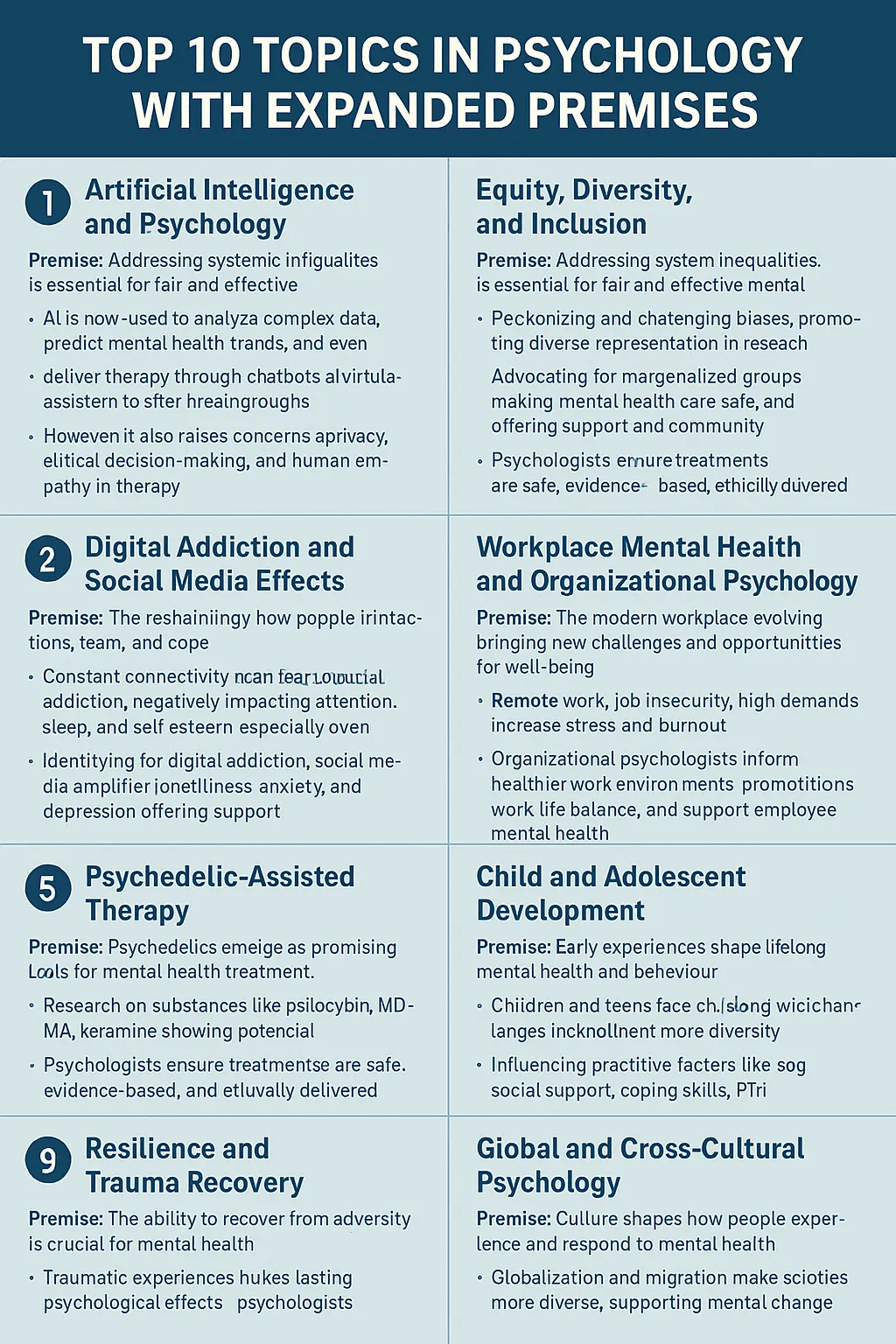Top 10 Topics in Psychology with Expanded Premises
1. Artificial Intelligence and Psychology
Premise: The integration of artificial intelligence (AI) is revolutionizing psychological research and practice.
AI is now used to analyze complex data, predict mental health trends, and even deliver therapy through chatbots and virtual assistants. This technology can increase access to care, especially in underserved areas. However, it also raises concerns about privacy, ethical decision-making, and the importance of human empathy in therapy. Psychologists must adapt to these changes, ensuring AI is used responsibly and effectively to complement—not replace—human clinicians.
2. Equity, Diversity, and Inclusion
Premise: Addressing systemic inequalities is essential for fair and effective mental health care.
Psychology has a responsibility to recognize and challenge biases related to race, gender, sexuality, and socioeconomic status. This involves promoting diverse representation in research, developing culturally sensitive interventions, and advocating for marginalized groups. By fostering equity and inclusion, psychologists can help close gaps in mental health outcomes and create a more just society.
Ready to Experience a Life-Changing Breakthrough?
Unlock the “Journey of the Soul” Brainwave Entrainment Series Now and Activate the Hidden Power Within You!
Start Your Transformation Today—Click Here to Begin Your Journey!
3. Digital Addiction and Social Media Effects
Premise: The digital age is reshaping how people interact, learn, and cope.
Constant connectivity can lead to digital addiction, negatively impacting attention, sleep, and self-esteem—especially among youth. Social media platforms can amplify feelings of loneliness, anxiety, and depression, but they can also offer support and community. Psychologists study these dual effects to help individuals build healthier relationships with technology and develop interventions for problematic use.
4. Mental Health Disparities and Access to Care
Premise: Many people face barriers to obtaining mental health services.
Socioeconomic status, geographic location, stigma, and lack of insurance all contribute to disparities in care. Psychologists are working to identify these barriers and advocate for policy changes, telehealth solutions, and community-based programs that make mental health support more accessible and affordable for everyone.
5. Psychedelic-Assisted Therapy
Premise: Psychedelics are emerging as promising tools for mental health treatment.
Research on substances like psilocybin, MDMA, and ketamine shows potential for treating depression, PTSD, and addiction. Psychedelic-assisted therapy combines these substances with professional guidance to foster breakthroughs in emotional processing. However, this field is still new, and psychologists must ensure treatments are safe, evidence-based, and ethically delivered.
6. Workplace Mental Health and Organizational Psychology
Premise: The modern workplace is evolving, bringing new challenges and opportunities for well-being.
Remote work, job insecurity, and high demands can increase stress and burnout. Organizational psychologists help companies design healthier work environments, promote work-life balance, and support employee mental health. This benefits both individuals and organizations by boosting morale, productivity, and retention.
7. Cognitive Neuroscience and Brain Function
Premise: Understanding the brain is key to unlocking human behavior and mental processes.
Cognitive neuroscience uses advanced imaging and experimental techniques to study memory, decision-making, emotion, and consciousness. Insights from this research inform everything from educational strategies to treatments for neurological and psychiatric disorders, deepening our understanding of the human mind.
Ready to Experience a Life-Changing Breakthrough?
Unlock the “Journey of the Soul” Brainwave Entrainment Series Now and Activate the Hidden Power Within You!
Start Your Transformation Today—Click Here to Begin Your Journey!
8. Child and Adolescent Development
Premise: Early experiences shape lifelong mental health and behavior.
Children and teens today face unique challenges, including exposure to technology, academic pressure, and social change. Psychologists study how factors like parenting, trauma, and peer relationships influence development. This research helps create effective interventions for issues such as anxiety, bullying, and identity formation, supporting healthy growth from childhood through adolescence.
9. Resilience and Trauma Recovery
Premise: The ability to recover from adversity is crucial for mental health.
Traumatic experiences—ranging from personal loss to global crises—can have lasting psychological effects. Psychologists explore what makes some individuals more resilient than others, identifying protective factors like social support, coping skills, and positive thinking. Trauma-informed care and resilience-building interventions empower people to heal and thrive after hardship.
10. Global and Cross-Cultural Psychology
Premise: Culture shapes how people experience and respond to mental health challenges.
Globalization and migration have made societies more diverse. Psychologists study how cultural beliefs, values, and practices influence mental health, diagnosis, and treatment. By adopting a cross-cultural perspective, they develop interventions that are respectful, relevant, and effective for people from different backgrounds, promoting mental health on a global scale.
Ready to Experience a Life-Changing Breakthrough?
Unlock the “Journey of the Soul” Brainwave Entrainment Series Now and Activate the Hidden Power Within You!
Start Your Transformation Today—Click Here to Begin Your Journey!














